The 7th month in the Chinese lunar calendar, widely associated with the opening of the gates of Hell, is a month of auspicious significance in the Buddhist faith. It is also a time when sentiments of spiritual joy and gratitude come forth. For many years, Tzu Chi KL & Selangor has been organizing a series of fellowship-cum-prayer sessions based on the teachings expounded in the “Ksitigarbha Sutra” in conjunction with the Auspicious Month. As part of this year’s festivities, the Tang Mei Yun Taiwanese Opera Company presented “The Story of Bright-eyes Rescuing Her Mother” to local audiences to impart the importance of filial piety and the true meaning of salvation.
On July 3, 2019, the Tang Mei Yun Taiwanese Opera Company, led by established Taiwanese opera performer Tang Mei-yun, travelled from Taiwan to the shores of Singapore and Malaysia for a performance tour spanning both sides of the Causeway. The tour concluded in Kuala Lumpur at the KL Tzu-Chi Jing Si Hall in Kepong, with three sessions of Memoirs of Eminent Monks: The Great Dharma Master Zhizhe over July 19 and 21, 2019, as well as two performances of The Story of Bright-eyes Rescuing Her Mother on July 20, 2019. The latter, adapted for the stage from the eponymous parable extracted from the Ksitigarbha Sutra, extolled the virtues of righteous beliefs, protecting lives and filial piety. The lively, engaging performances attracted audiences of over 2,000, and proceeds from the ticket sales were channelled to the TCISKL construction fund.
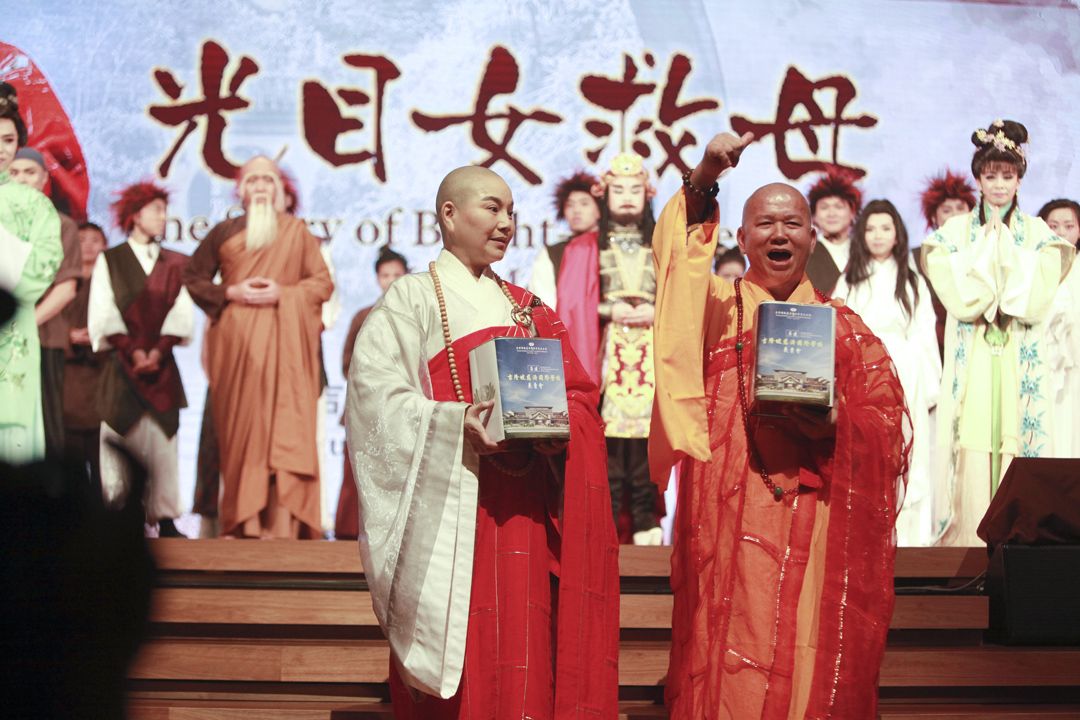
The KL Tzu-Chi Jing Si Hall was bustling with activity throughout the day as the Dharma Hall, where the performance was held, was packed to capacity. Prior to the performance, the Dharma masters present led the audience in reciting verses from the Incense Praise and Sutra Opening Verse, followed by a video lecture by Master Cheng Yen on the significance of the Auspicious Month. The Master stressed that one would remain unperturbed by the superstitions surrounding the 7th lunar month by resisting one’s desires and abstaining from killing for meat.
Chuang Shih-hung, who composed the script for The Great Dharma Master Zhizhe, delivered a pre-performance briefing on the highlights of The Story of Bright-eyes Rescuing Her Mother, enabling the audience to better appreciate the message of filial piety conveyed through the play.
“The Story of Bright-eyes Rescuing Her Mother is derived from the Ksitigarbha Sutra, which contains teachings distilled from Gautama Buddha’s insights on the laws of karma and reincarnation. It calls upon devotees to abstain from claiming lives by observing a vegetarian diet, commit to kind deeds and respect our elders to avoid descending to hell in the afterlife. If we take our commitment a step further by seeking refuge in the Three Jewels [of Buddhism, namely Buddha, Dharma and Sangha], it is possible to attain liberation from the cycle of reincarnation,” explained Shih-hung.
Bright-eyes, the titular character of the play, was one of the incarnations of the Ksitigarbha Bodhisattva before he attained Buddhahood. She devoted herself to the Three Jewels and transferred the merits from her kind deeds to her mother to ensure her health and longevity. On the other hand, Bright-eyes’ mother was ignorant of the Three Jewels and had an appetite for seafood that accumulated in negative karma. In death, she was condemned to suffer in the unremitting depths of hell. Bright-eyes could not bear to see her mother in agony and made a vow to save her mother from karmic retribution.
Captivating performances
The cast brought the story to life with their evocative performances, capturing the attention of the audience as the play unfolded. Witty, comical scenes and the expressive, animated antics of several cast members injected a dose of humour into the story, leaving the audience in stitches at various points of the play.
Many members of the audience attended both performances of The Great Dharma Master Zhizhe and The Story of Bright-eyes Rescuing Her Mother. Among them was Loh Pit Fong, the choreographer for the 2017 production of Di Zang: The Musical. She remarked that both shows left a profound impact on her. She is grateful to Tzu Chi for introducing traditional Taiwanese opera to local audiences. “The shows exemplified the essence of a traditional art form. The articulate performances and convincing portrayals added depth to the performance,” she commented.
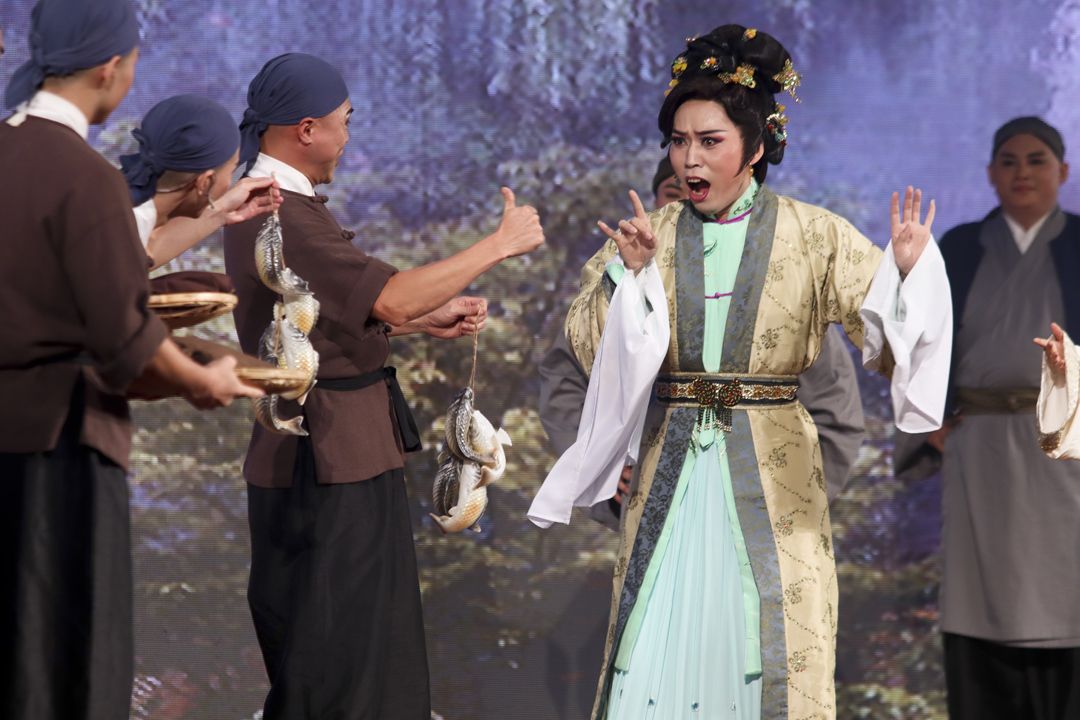
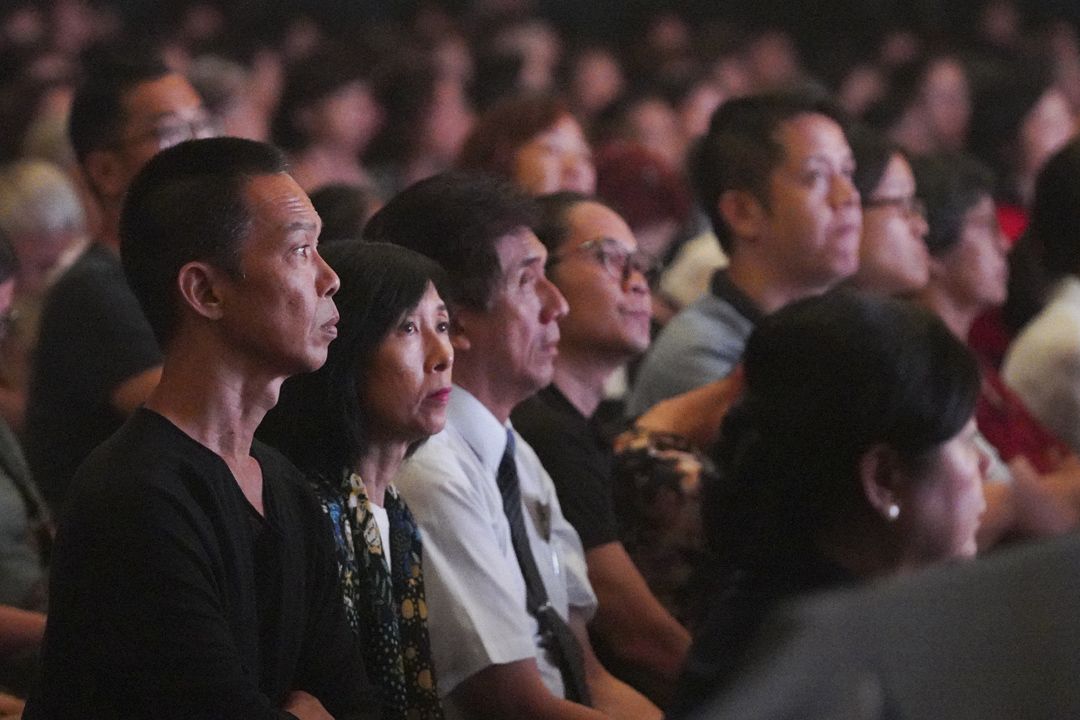
The light-hearted tone of the play took a grave turn as the audience was transported to an underworld setting, a bottomless, inescapable pit of despair whose harsh conditions were enhanced by lighting and sound effects. The bitter, anguished cries of Bright-eyes’ mother, covered in cuts and bloodied wounds, reverberated throughout the scene, implying the appalling extent of torment suffered by the inhabitants of the underworld. The terrifying sights and sounds demonstrated with gripping impact the grievous consequences of karmic retribution, while at the same time evoking an immersive experience for the audience as the plot progressed at a dynamic pace.
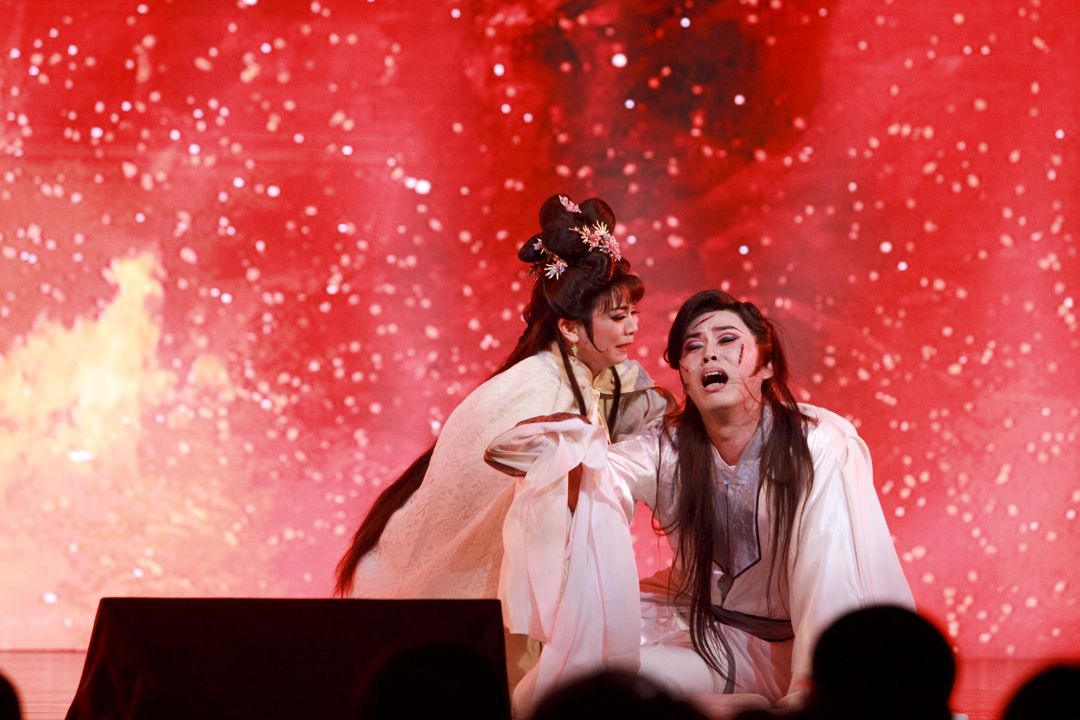
A member of the audience, Tong Sow Sin, was particularly struck by the underworld scene. “The underworld depicted in the scriptures is even more harrowing than that portrayed on stage. It made me ponder our indifference to killing live beings for meat. If Bright-eyes’ mother were to heed her daughter’s advice, she wouldn’t have ended up in hell,” she reflected.
Sow Sin admitted that she would be moved by Bright-eyes’ compassion and kindness whenever she revisited the story of Bright-eyes rescuing her mother. “My late mother often encouraged us to perform kind deeds and adopt a vegetarian diet during her lifetime,” she recalled, close to tears as memories of her late mother came flooding back.
Sow Sin is now content as her wish to embrace vegetarianism with her children was fulfilled three years ago. She observed that the lifestyle change has brought a positive influence to her overall well-being. “Now, I wake up every morning in a relaxed state with a clear mind instead of feeling tense,” she said.
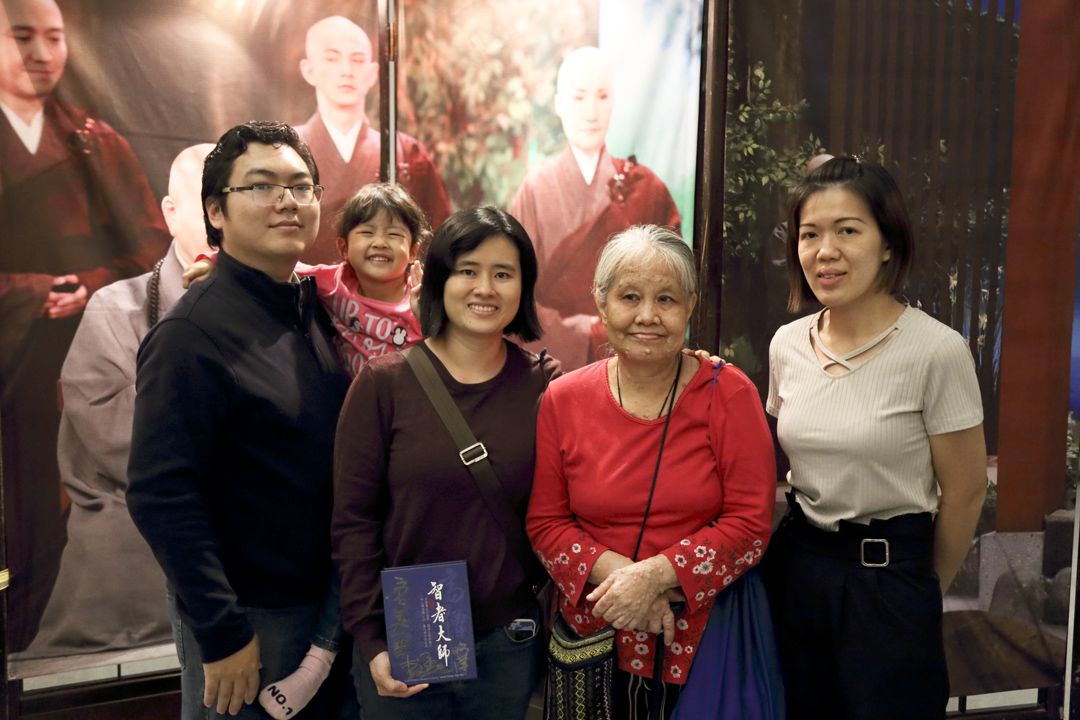
An honourable vow
In another scene, Bright-eyes followed the Lord of Hell on a tour of the underworld, where she found her mother severely wounded and hounded by a pack of beasts. She could not believe that the bloodied, battered soul before her eyes was indeed her mother, whom she missed dearly.
Upon witnessing the torment her mother endured, Bright-eyes vowed to liberate all beings in all realms from suffering before attaining Buddhahood herself. She stayed true to her vow and subsequently manifested in the form of the Ksitigarbha Bodhisattva, played by Tang Mei-yun, who entered the scene with a khakkhara staff and a cintamani jewel in either hand, shuffling slowly across the hall while serenading the Ksitigarbha Bodhisattva’s benevolence in a dignified, sombre refrain.
The play ended on a high note to rapturous applause from the audience. Malaysian Buddhist Association (Kuala Lumpur/Selangor Branch) vice-chairman Venerable Chang Chao appealed to the audience to contribute to the Tzu Chi International School Kuala Lumpur (TCISKL) construction fund. He was backed by Mei-yun, who quipped, “This is my first time ‘begging for alms’ like the Dharma masters I have portrayed. Your donations are most appreciated, regardless of the amount. It’s the sincerity that counts.”
Lessons on filial duty and compassion
Venerable Jue Xian from the Qian Fo Temple in Klang was invited by volunteers to attend the performance. “I’m impressed. I used to think that traditional Taiwanese opera is limited to an elderly audience, but this performance has proved otherwise. It felt as if I’ve acquainted myself with the Sutra through the play,” he said, before adding that the Sutra is widely read by many, yet thoroughly understood by few.
Venerable Jue Xian also opined that the play has made the core message of the Sutra more accessible. He was touched by Bright-eyes’ filial intentions to rescue her mother from the flames of hell, saying, “The teachings of the Dharma are rooted in the virtue of filial piety, which, if not upheld, will render the Dharma obsolete.”
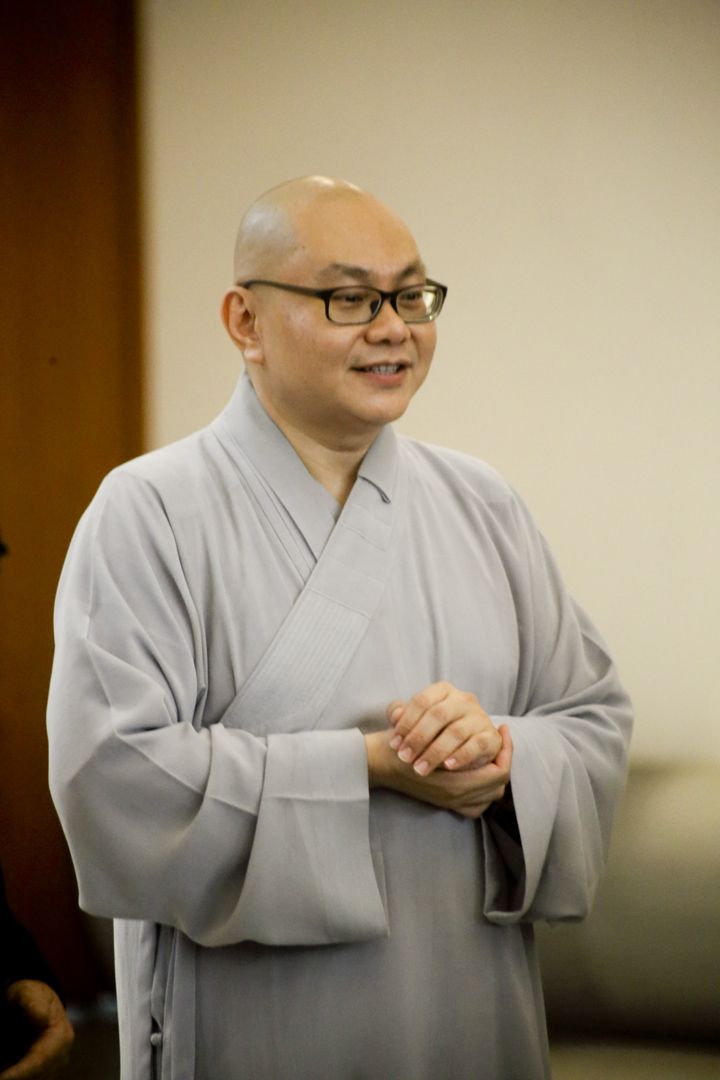
Penang-based volunteer Lee An Gin and over 20 fellow volunteers embarked on a 6-hour journey by bus to the performance venue. An Gin bought tickets to the play with the initial intention of supporting TCISKL; little did she expect to be moved to tears by the story. “I’ve heard the story of Bright-eyes before and watched the series on Da Ai TV, but this is my first time seeing it presented in a Taiwanese opera format. I didn’t expect to be moved by it,” she professed.
The scenes depicting Bright-eyes’ mother consuming fish roe and being tortured in hell reminded An Gin of her own deceased parents. Growing up in a fishing village, her father relied on fishing for a living. Furthermore, her parents loved consuming fish. This led her to worry that her parents would suffer in hell like Bright-eyes’ mother owing to the negative karma accumulated from the lives they claimed.
Bright-eyes’ selfless pledge to deliver all beings from suffering in exchange for her mother’s liberation from the depths of hell made An Gin realize that filial piety is tantamount to performing virtuous deeds and transferring the accrued merits to our parents. She was inspired to commit herself to charity to sow more blessings for her parents.
Another audience member, Joey Heng, revealed that she had been watching Taiwanese opera programmes featuring Tang Mei-yun since young. She captured photos of the underworld setting to serve as a lesson to her children. “I’ll teach my children about the karmic cycle and the importance of practising virtuous and filial deeds, besides observing a vegetarian diet to avoid taking lives and to save the environment,” she shared.
John Raj, volunteer Chong Li Lei’s chauffeur, managed to watch the play while waiting for his employer and developed a keen interest in catching the final performance of The Great Dharma Master Zhizhe – even taking a day’s leave from work to appreciate the performance in its entirety.
div>
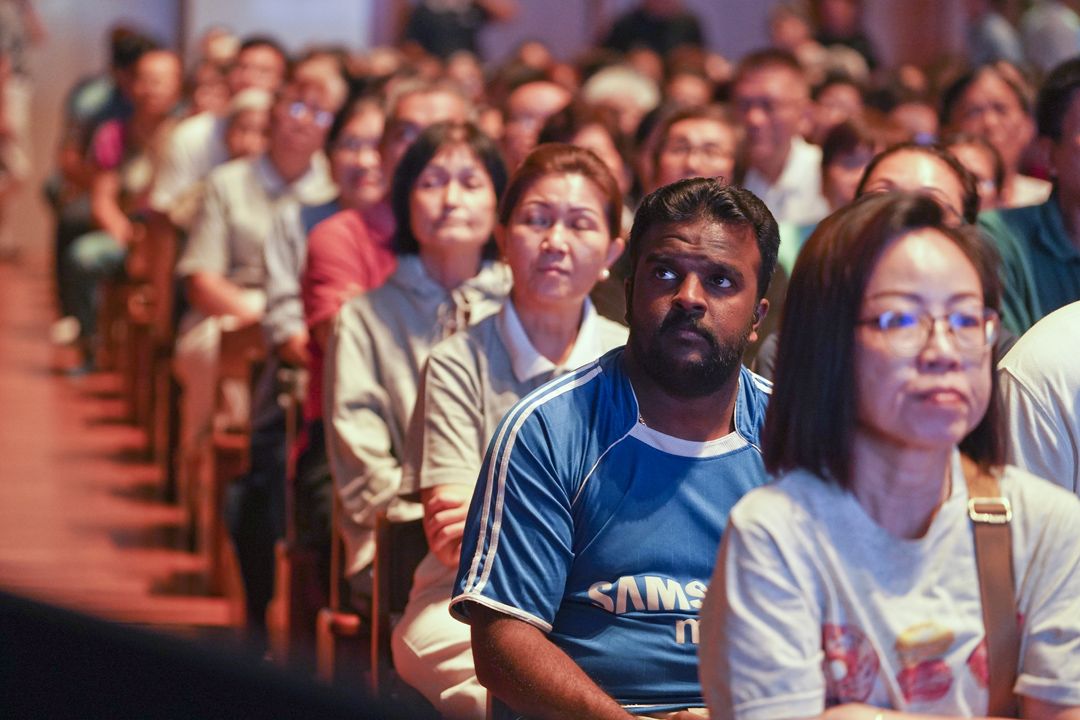
As a Christian himself, John noted that the virtues of committing to kind deeds and refraining from killing form the core of the teachings of both Buddhism and Christianity. He learnt about the karmic law of retribution through his encounter with Buddhism, prompting him to reflect, “I’ve done wrong in the past, but I want to turn my life around. We’ve to be kind-hearted and love one another.”
•
Incorporating the teachings of the Dharma in a stage performance, such as The Story of Bright-eyes Rescuing Her Mother reflects Master Cheng Yen’s intention to make the way of the Dharma more accessible to the masses, with Bright-eyes a model to all in undertaking honourable vows for the greater good.





